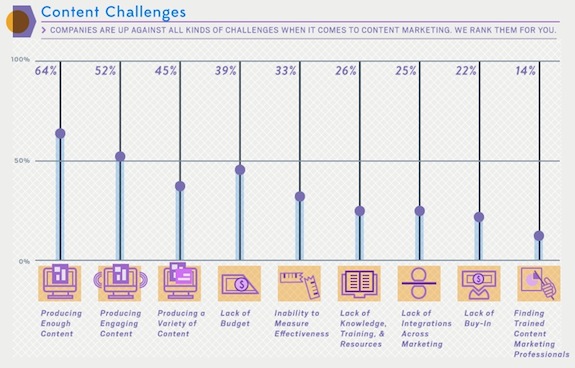Almost simultaneously this week 2 studies were published on the trends and effectiveness of content marketing in B2B. What is their common denominator, and what prove to be the key insights and opportunities in B2B content marketing in 2013?
What surveys are we talking about? The first is an international study periodically carried out by the Content Marketing Institute in cooperation with Marketingprofs.com. The other poll has more of a local dutch flavour and focuses on IT companies in the so-called ICT-valley (a subregion in Utrecht Province, the Netherlands). That regional assessment was conducted and communicated under the title ‘inbound marketing’ in ICT. As far as I’m concerned the similarities between these two concepts far outweigh the differences. Therefore they’re used interchangeably here.
In the report following the local survey ‘Inbound Marketing in ICT’ these items stand out:
– LinkedIn and Twitter are the most popular sociale media – by far.
– Key obstacles in truly leveraging content marketing are sufficient time, adequate knowledge and securing sufficient commitment within the organisation.
– In lead generation the average (regional) IT company still behaves rather conservatively: emphasis is placed on trade shows and word-of-mouth. This ironically constitutes a major chance to use the power of online as lever in more powerful earned media.
In Content Marketing Institute research these are the key items worth a recap:
– 64% of all respondents indicate ‘sufficient content’ as their key challenge. This is even higher than the amount of B2B marketing professionals who emphasize the importance of ‘engaging content’ (52%). Quantity seems to prevail over quality.
– Slideshare’s low adoption rate; less than a quarter (23%) of B2B marketeers use this presentation platform to share their knowledge, insights and vision (Slideshare which by the way makes a great add-on to LinkedIn).
– Some 33% of respondents fail to indicate how effective their content marketing really is. In my opinion this is unnecessarily high, as content marketing and enhanced accountability go hand-in-hand to provide ‘closed loop marketing’. Paradoxically only 21% is facing issues in low management commitment or buy-in from. One would expect this percentage to equal to the amount of companies that fail to render content marketing sufficiently ‘smart’.
– Content marketing’s adoption further increases to 87% (from 74% in 2011). Yet the actual usage of content marketing seems to be focused on distributing one’s own message. As a new ‘push-channel’ therefore. A missed opportunity.
– Only 36% would rate one’s own content effective. Room for improvement for most companies, which shows there is a clear ambition to do better contentwise. It would be interesting to ascertain what the overlap is between these respondents and those who indicated to question the effectiveness of their own content marketing.
Conclusion to be drawn from both surveys: there is a lot of work to be done in truly leveraging content marketing in business-to-business. To my opinion this starts in thinking from less quantity, more high-quality engaging content. Content providing answers to buyer questions in respective markets. Instead of statements driven by one’s own sales targets. With a clever eye for ROI, securing better top management commitment or buy-in. In short: less content, more buy-in.
Want to see more details and conclusions? See the infographic below.
Should you want to obtain further information on what effective content marketing can do for you, contact us for further information or a cup of coffee.



Leave a Reply
Want to join the discussion?Feel free to contribute!